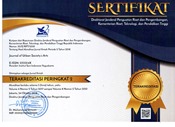Power Relations in the Design and Development of Karangwaru Riverside Yogyakarta-Indonesia – Women's Perspective
Abstract
The design and construction of riverbanks in Karangwaru is a community participation-based development program where stakeholders play a role in the preparation of development and its implementation. The involvement of women as one of the stakeholders is one of the positive efforts for gender equality programs. However, women's voices in percieving the results of such development have never been clearly explored. How women respond to the development process and how power relations are created in a built environment are yet to be revealed. This study aims to see how power relations are formed in the design and development of Karangwaru Riverside. Using the Foucauldian discourse analysis method, this study managed to find 7 (seven) constructs and discourses that surround them. The results show that women have only control over two discourses, namely ethical and social discourse.
Desain dan pembangunan bantaran sungai di Karangwaru merupakan program pembangunan berbasis partisipasi masyarakat di mana pemangku kepentingan berperan dalam persiapan pembangunan dan pelaksanaannya. Keterlibatan perempuan sebagai salah satu pemangku kepentingan merupkan salah satu upaya positif bagi program penyetaraan gender dalam pembangunan. Meskipun demikian suara perempuan dalam melihat hasil pembangunan tersebut belum pernah dieksplorasi dengan jelas. Bagaimana perempuan menyikapi proses pembangunan dan bagaimana relasi kuasa yang tercipta dalam lingkungan terbangun masih belum terungkap. Penelitian ini bertujuan untuk melihat bagaimana relasi kuasa yang terbentuk dalam desain dan pembangunan Karangwaru Riverside. Dengan menggunakan metode analisis diskursus Foucauldian, penelitian ini berhasil menemukan 7 (tujuh) konstruk dan diskursus yang melingkupinya. Hasilnya menunjukkan bahwa perempuan hanya memiliki kontrol pada dua diskurus yaitu diskursus etika dan sosial.
Keywords
Full Text:
PDFReferences
Asteria, D., Budidarmono, B., Herdiansyah, H., & Ni’Mah, N. L. (2018). Gender sensitive education in watershed management to support environmental friendly city. IOP Conference Series: Earth and Environmental Science, 126(1), 8–14. https://doi.org/10.1088/1755-1315/126/1/012146
Dale, E. J., Ackerman, J., Mesch, D. J., Osili, U. O., & Garcia, S. (2018). Giving to Women and Girls: An Emerging Area of Philanthropy. Nonprofit and Voluntary Sector Quarterly, 47(2), 241–261. https://doi.org/10.1177/0899764017744674
Dewi, N. (2020). River, Resistance and Women’S Resilience in Indonesian, Malaysian and Vietnamese Fictions. LiNGUA: Jurnal Ilmu Bahasa Dan Sastra, 15(1), 1–10. https://doi.org/10.18860/ling.v15i1.7487
Dharmadiatmika, A. (2021). Ruang aktivitas perempuan dalam arsitektur vernakular Gunungsari , Tabanan , Bali. July. https://doi.org/10.24843/JAL.2018.v04.i01.p14
Doyle, S., & Senske, N. (2017). Democratizing Access and Identifying Inequalities : Gender , Technology , Architecture Democratizing Access and Identifying Inequalities : Gender , Technology ,.
Foucault, M. (1980). Power/Knowledge. In C. Gordon (Ed.), Nature. Pantheon Books. https://doi.org/10.1038/433570a
Jabeen, H. (2019). Gendered space and climate resilience in informal settlements in Khulna City, Bangladesh. Environment and Urbanization, 31(1), 115–138. https://doi.org/10.1177/0956247819828274
Maicantis, P. M., & Paine, C. (2016). Gender and Sexuality in Design : Discourses on Gender , Sexuality and Inclusivity in Community Design and Analysis of Theoretical Frameworks for Gender-Neutral and Gender-Sensitive Design by.
Nugroho, A. C. (2017). KOMUNIKASI KELOMPOK , DISKURSIF DAN PUBLIC SPACE. 181–192.
ÖZTÜRK-, Y. M. (2020). EKOFEMİNİZME GenelBi̇r Bakiş: Kadinlar, Doğa VHi̇yerarşi̇ler. The Journal of Academic Social Science Studies, Year: 13-(Year: 13-Number: 81), 705–714. https://doi.org/10.29228/jasss.45458
Putri, L. I., & Handayani, L. L. A. (2020). Women Emancipation and Empowerment in The Incredibles 1 and 2. Journal of Urban Society’s Arts, 7(1), 30–42. https://doi.org/10.24821/jousa.v7i1.4356
Rinawati, R. (2004). PARTISIPASI WANITA DALAM PEMBANGUNAN Kajian Gender mengenai Partisipasi Wanita dalam Pembangunan Partisipatif melalui Pemberdayaan Masyarakat Rini Rinawati **. Mimbar, XX(25), 387–405.
Selanon, P. (2020). Michel Foucault and the Perception of Landscape Architecture Practices. https://www.researchgate.net/publication/341262837
Widyaevan, D. A. (2022). Ephemeral Architecture as Socio-spatial Practices in Bintaro ’ s Modern Market Public Space. April.
Willig, C. (2013). Introducing Qualitative Research in Psychology. Open University Press.
Zein, L. F., & Setiawan, A. R. (2017). General Overview of Ecofeminism. Lλ×Λrs, August 2017, 1--10.
DOI: https://doi.org/10.24821/jousa.v9i2.9370
Refbacks
- There are currently no refbacks.

This work is licensed under a Creative Commons Attribution 4.0 International License. ISSN 2355-2131 (print) | ISSN 2355-214X (online).






